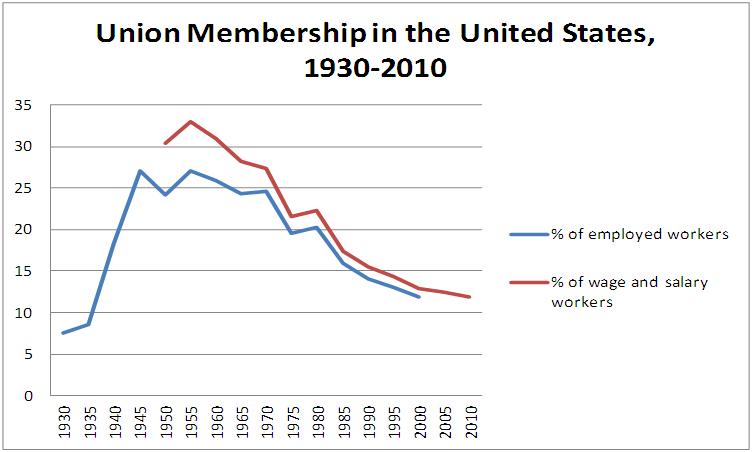Kingu Kurimuzon
Well-known member
- Joined
- Aug 27, 2013
- Messages
- 20,940
- MBTI Type
- I
- Enneagram
- 9w8
- Instinctual Variant
- sp/sx
[MENTION=8936]highlander[/MENTION]
[MENTION=37565]Maou[/MENTION]
So far these criticisms of unions seem to be general criticisms that could apply to many types of organizations. For instance, as another member already pointed out, the criticism that unions stifle productivity levels is generally true about a lot of non-union businesses as well. I worked in a factory in a non-union state and we also had to deal with quota levels, being told to essentially pace our work, even at times when we could've completed weekly work rates early. I also saw obviously less-qualified people sometimes promoted or given raises purely on the basis of seniority or how well they got along with the boss rather than any consideration of merit. These problems are in no way limited to unions, and singling them out as though they are whilst naively pretending non-union companies only care about innovation, maximum productivity and merit-based advancement is dishonest--it involves comparing one on the dirty reality and the other on the flowery ideal. It doesn't seem based in any objective comparison so much as is in a tendency to evaluate unions only on their worst aspects whilst evaluating non union business practices only on their best traits or their ideal operating models. I don't claim unions to be perfect or ideal, but at least evaluate them in a fair light rather than just repeating the same tired anti-union talking points replete with words and phrases such as "stifle growth", "innovation" etc.
[MENTION=37565]Maou[/MENTION]
So far these criticisms of unions seem to be general criticisms that could apply to many types of organizations. For instance, as another member already pointed out, the criticism that unions stifle productivity levels is generally true about a lot of non-union businesses as well. I worked in a factory in a non-union state and we also had to deal with quota levels, being told to essentially pace our work, even at times when we could've completed weekly work rates early. I also saw obviously less-qualified people sometimes promoted or given raises purely on the basis of seniority or how well they got along with the boss rather than any consideration of merit. These problems are in no way limited to unions, and singling them out as though they are whilst naively pretending non-union companies only care about innovation, maximum productivity and merit-based advancement is dishonest--it involves comparing one on the dirty reality and the other on the flowery ideal. It doesn't seem based in any objective comparison so much as is in a tendency to evaluate unions only on their worst aspects whilst evaluating non union business practices only on their best traits or their ideal operating models. I don't claim unions to be perfect or ideal, but at least evaluate them in a fair light rather than just repeating the same tired anti-union talking points replete with words and phrases such as "stifle growth", "innovation" etc.

